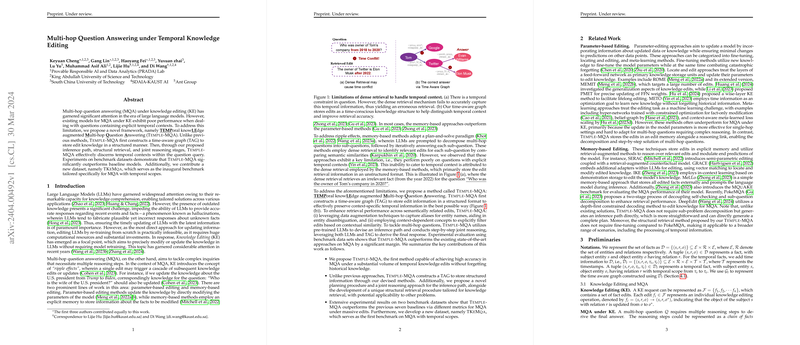Enhancing Multi-Hop Question Answering with Temporal Knowledge Using Temple-MQA
Introduction
The paper focuses on multi-hop question answering (MQA) that involves knowledge editing (KE), particularly under scenarios that require managing temporal knowledge edits efficiently. Existing methods encounter significant difficulties when handling MQA that demand awareness of temporal contexts. The proposed Temple-MQA framework refines this process through the integration of a time-aware graph (TAG), which organically handles the ripple effects of knowledge edits over time, crucially maintaining context and preventing the common LLM pitfall of hallucination.
Addressing the Limitations of Existing Approaches
The primary challenge addressed by Temple-MQA is the ineffective handling of temporal information in existing MQA models that utilize knowledge editing. The conventional dense retrieval systems used in KE do not structure information temporally, often leading to mismatched or outdated data being retrieved. This issue is amplified with questions that explicitly reference temporal contexts, where the retrieval mechanism's limitations become particularly glaring, as illustrated in various comparative experiments in the paper.
Temple-MQA Framework
Temple-MQA introduces several innovative components to tackle these issues:
- Time-Aware Graph (TAG): By creating a structured graph that maps knowledge edits with their respective temporal contexts, Temple-MQA ensures more precise data retrieval.
- Improved Retrieval Process: Includes data augmentation techniques for better entity recognition and disambiguation, alongside the use of context-dependent filters to enhance retrieval accuracy.
- Joint Reasoning and Inference Path Planning: Utilizes LLMs to ideate an inference path for querying the system effectively, allowing coherent, step-by-step reasoning that respects the structured nature of TAG.
- Evaluation and Dataset Contribution: Extensive tests on benchmark datasets validate Temple-MQA's superior performance. Furthermore, the introduction of a new dataset, TKeMqa, tailored for temporal MQA, enriches the research landscape.
Experimental Validation
Temple-MQA demonstrates significant improvements over the seven existing baseline models across different evaluative metrics. These enhancements are evident in scenarios that involve complex temporal constraints and large volumes of data edits where traditional models struggle. The newly proposed TKeMqa dataset also serves as a robust platform for testing MQA models' efficacy in handling explicit temporal knowledge.
Conclusions and Future Work
The research delineates a clear path forward for integrating structured temporal data handling within LLM-driven MQA frameworks. The introduction of the TAG component within Temple-MQA not only refines the retrieval of edited knowledge but also sets a precedent for future explorations into more context-aware AI-driven question answering systems. Future studies might explore automated optimizations of TAG construction and real-time adaptation to new knowledge edits, potentially expanding the model's applicability across various dynamically changing information domains.
